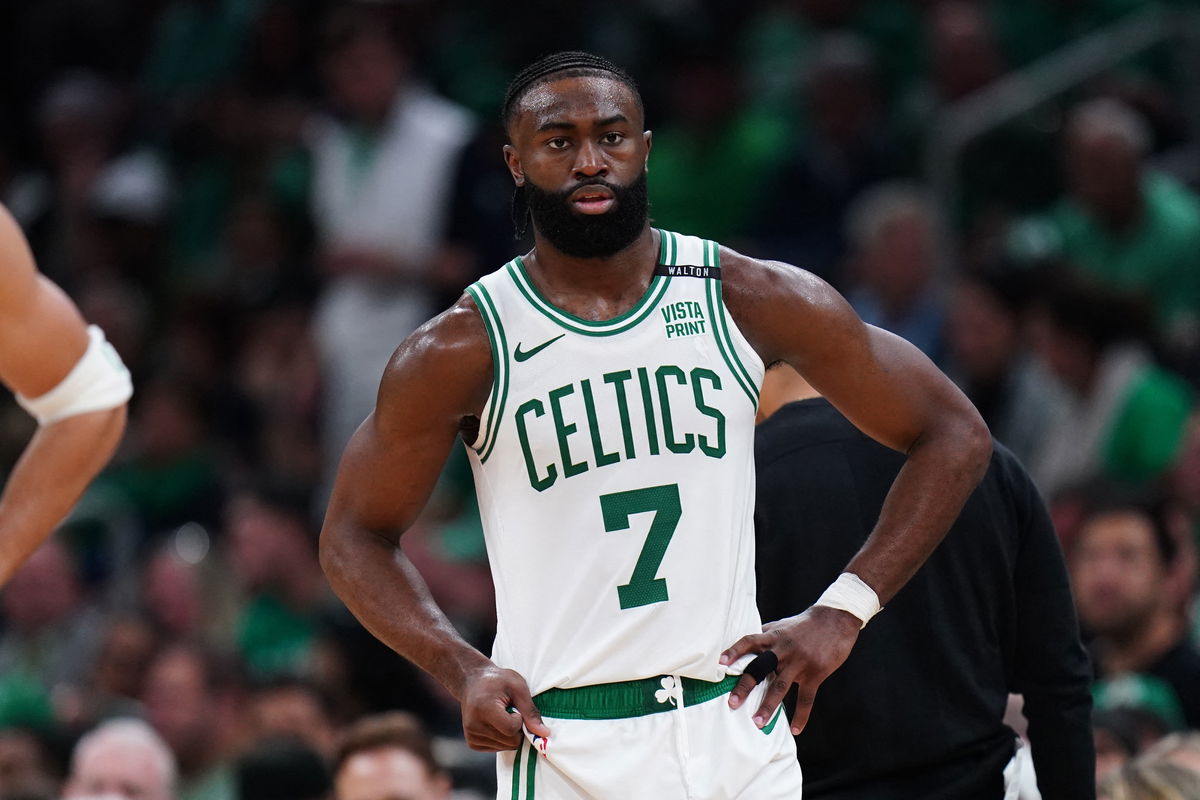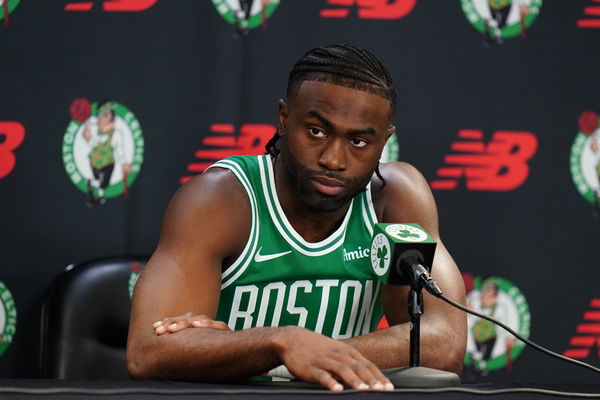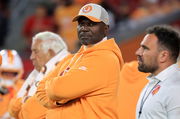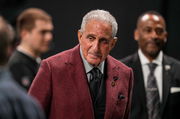
USA Today via Reuters
Jun 6, 2024; Boston, Massachusetts, USA; Boston Celtics guard Jaylen Brown (7) looks on in the third quarter against the Dallas Mavericks during game one of the 2024 NBA Finals at TD Garden. Mandatory Credit: David Butler II-USA TODAY Sports

USA Today via Reuters
Jun 6, 2024; Boston, Massachusetts, USA; Boston Celtics guard Jaylen Brown (7) looks on in the third quarter against the Dallas Mavericks during game one of the 2024 NBA Finals at TD Garden. Mandatory Credit: David Butler II-USA TODAY Sports
If you thought that the generally negative reception to his 741 Rover “Black Moon” would make Jaylen Brown reconsider his stance on Nike, think again. The 2024 NBA champ seems to have no intention of peace talks with Nike. You couldn’t possibly have forgotten about Brown’s head-to-head with the sports apparel giant, particularly concerning the recent Team USA snub. And now, the 27-year-old has added another layer to the intense feud.
Watch What’s Trending Now!
Appearing on the Stephen A. Smith Show, JB left nothing to the imagination in his sharp criticism of the globally renowned brand. The first question Stephen A. had for Brown was obviously being left off of the 2024 Olympics. And Jaylen, being Jaylen, took the chance to phrase the reply in such a way that his dislike (putting it mildly) was on full display.

Imago
Sep 24, 2024; Boston, MA, USA; Boston Celtics guard Jaylen Brown (7) talks to reporters during media day at Auerbach Center. Mandatory Credit: David Butler II-Imagn Images
“The emotions, it was a lot,” Brown admitted, referring to the snub. And here comes the dig! “But I’ll say this. In 2028, if I have to sign to Nike to increase my likelihood to play USA basketball, I’ll pass.” Well … message issued loud and clear!
ADVERTISEMENT
If you remember, when the final selection for Team USA came to light, Brown took to X with a series of cryptic posts – one with a bunch of monocle emojis, clearly referring to his skepticism. The next was a direct mention, “@nike, this what we doing?” and finally, another cryptic note, “Im not afraid of you or your resources.” Although details of the matter weren’t divulged, it was clear that Jaylen Brown took offense with Nike – a beef that went back as far as 2022. However, the 3x All-Star clarified the reason for this ongoing (more of an on-and-off) battle. “I think shoe companies should have less control over the industry right now. … politics is not synonymous with basketball,” he emphasized.
It’s true that with all the signature shoe lines and endorsements, even among younger athletes, attention has shifted from the love for the game to the monetary benefits it brings. What was once just a tool that allowed players to better their game has turned into a multi-billion-dollar corporate organization that more or less now controls the narrative of professional sports. How so, though?
ADVERTISEMENT
Jaylen Brown details why brands like the $121 billion Nike negatively affect the landscape of sports
Per JB, it starts at the “grassroots.” And who belongs to the most basic foundations? Why, none other than the kids! “I think, the essence, like you see it in our grassroots. Kids, instead of enjoying the essence of basketball, are forced to pick a side,” Brown stated, clearly expressing his frustration with how these brands are shaping the culture of sports.
ADVERTISEMENT
He pointed out that rather than focusing on development and further cultivating that love that brought them here in the first place, young athletes face the pressure to align with major brands. Moreover, it fosters a competitive atmosphere where kids end up paying more attention to brand loyalty than personal development. But that wasn’t all. Jaylen further pointed out another worrying aspect. “I look at our global game, and Europe is closing the gap,” he noted, highlighting how competition from overseas is intensifying.
Critics argue that this growing influence of the commercialization of sports has led to an unhealthy culture. For one, those without brand affiliations might have limited opportunities. As such, they feel compelled to associate with a particular brand for better visibility and recognition, once again, as Brown pointed out, taking away from enjoying the “essence of basketball.”
Top Stories
Forced to Leave FOX, Cowboys Legend Troy Aikman Says ESPN Is Like ‘U.S. Government’ & Clearly Distinguishes the Two Networks

Todd Bowles Points Fingers at Baker Mayfield & Co. in a Strong Statement That Could Get Him Punished After Bucs Loss

What Settlement Agreement Have Michael Jordan & NASCAR Reached? Everything to Know From Evergreen Charters to Payout

Arthur Blank Makes Firing Decision on Raheem Morris After Falcons HC Lands on Hot Seat

Cowboys Legend Troy Aikman Teases NFL Comeback After Airing FOX’s Dirty Laundry

Charley Hull Opens Up on Traumatic Divorce from Ex-Husband for the First Time Ever

Brown has made his stance clear: sports should remain separate from corporate influences. However, whether this can truly become a reality remains uncertain. What are your thoughts? Are these corporate giants truly exerting way too much influence in shaping young minds? Or are they necessary? Let us know in the comments.
ADVERTISEMENT
ADVERTISEMENT
ADVERTISEMENT
ADVERTISEMENT

